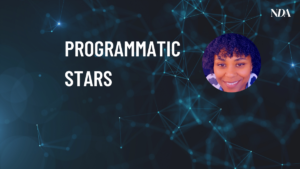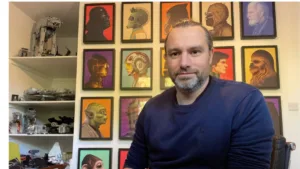Programmatic Stars celebrates the pioneers, trailblazers and innovators holding the role of Head of Programmatic, one critical to any company today.
Can Yildiz is Group Head Programmatic Europe at dentsu X. Prior to his current role he was Head of Programmatic Activation at Amnet.
What are the biggest challenges for programmatic and how will we overcome them?
Identity and measurement are the biggest challenges the entire digital ecosystem faces with the demise of third-party cookies and recently announced IDFA restrictions.
Even though there are many initiatives and emerging stakeholders for potential solutions, the industry still needs a fair – and I mean FAIR – identity framework in which independent publishers and technologies are not disadvantaged against the giants.
Any solution that overemphasises the 1st party data behind login walls would eventually be in favour of the industry-leading stakeholders. It would restrict advertisers to cooperate with a few leading players, which would result in unfair competitive advantages, hence, potential lawsuits in the long-term. Therefore, the framework should support an ID-agnostic approach across different ID solution providers for one-to-one matching within trackable users and outline a clear solution for one-to-many matching for non-trackable users through contextual segmentation.
Nonetheless, I also believe the ecosystem needs a strict regulatory update besides the framework. Over the last 10 years, the publishers that own the content have not been given adequate ownership of their data. Industry practices like user profiling over bid stream data or embedding javascript tracking without publisher approval must also be regulated.
I firmly believe that both advertisers and publishers should collaborate more to defend their mutual benefit of measurement. Additionally, having a separate legal authority that oversees all transactions would help the industry overcome these challenges.
Another big challenge is transparency. Advertisers would like to know how their media budget is spent across every vendor in the supply chain. Independent adtech companies already started offering clear visibility by exposing all fees charged to buyers and sellers while integrating with third parties that can audit the supply chain.
At dentsu X Germany, we help our clients be agile ahead of the market with clear guidance on crucial digital topics, such as data activation with identity solutions, supply chain transparency, and data privacy. That is one of the reasons our clients have put their faith in us, and we have received “the world’s fastest-growing agency” title for two consecutive years by RECMA.
3. What is the biggest opportunity for programmatic over the next year?
The required collaboration of all stakeholders that would hopefully achieve unified solutions.
Privacy, identity & measurement, and transparency concerns have compelled all stakeholders to sit around the table and find common ground. Tech vendors are open to collaborate to offer more flexible solutions and transparent transactions. Publishers have already invested more to make sense of their data in the last years, but only now have the opportunity to unite and claim rightful ownership of their data.
Brands have found themselves in a situation to reconsider and reevaluate how they reach audiences, measure success, and update their tech stack. Notably, the increased importance of first-party data opens the discussion of investing in CDPs and obtaining CRM technologies with better integration possibilities.
I think the industry has an excellent opportunity to tackle the issues collectively instead of providing siloed solutions. I hope that next year we will have a clearer picture of auditable, addressable, and more trusted digital practices while addressing privacy concerns.
What do you love most about your role as Head of Programmatic?
It is a role that broadens one’s vision thanks to close cooperation with talents sharing the same passion for technology, data, and even legal fields in the industry. Having a broad vision and knowing the history of the ecosystem allows programmatic leaders to forecast the future of digital marketing more accurately.
The role requires a variety of skill sets – not only being analytical but also having a commercial and consultative mindset is equally important. It is a must to know how to connect and onboard various technologies and data sources for activation, but I’m also entitled to build a product/solution based on ever-changing client needs and communicate your idea in a simplified manner. Unlike walled gardens, having a playground where I can build customised solutions by partnering with various vendors provokes creativity – which I find very satisfying.
The role demands constant vigilance and effort as the changes, restrictions, and innovations occur almost every other day. Whatever you know last month might easily be obsolete this month. I love that my role continually pushes me out of my comfort zone to learn more – who would have thought that I would read this many regulatory documents?
What is your proudest achievement in programmatic?
I have been working in Dentsu Aegis Network across different countries. As a mobile talent, I’ve had the opportunity to work with leading global brands and help launch programmatic teams from scratch or train and mentor talents to answer the client’s needs.
Even though each market and client bring their own unique challenges, building an appropriate solution and the efficient operation only takes to maintain a great balance of media, data, and tech skillsets in programmatic teams.
My proudest achievement is to see that my knowledge counts beyond the borders – leading international talents who tap the potential of the ecosystem with locally relevant tech, data, and media partnerships to able to say “YES!” to our clients make me feel self-actualized almost every day.
What innovation or technology in programmatic are you most excited about currently?
Custom bidding algorithms! In the times in which we emphasise the importance of 1st party data, building a first-party algorithm is changing the game. It is a vast potential to unlock for the advertisers rather than using one-size-fits-all bidding algorithms provided by adtech vendors.
Now, adtech vendors enable us to design a custom set of bidding rules aligned to the advertiser’s business goals and further empower this algorithm with first-party data by emphasising elements like contextual signals and attention-based metrics, which can be attributed to business objectives more efficiently.
Another innovation that makes me excited is the rise of new platforms in the programmatic ecosystem.
Programmatic DOOH inventory and its existing and potential targeting and measurement capabilities are quite fascinating. I quite enjoy talking to adtech vendors to build custom measurement solutions for this channel.
Last but not least, the growth of OTT inventory with the rapid rise of Connected TV is exciting. As COVID-19 has disrupted almost all facets of how we live and work, people are now far more likely to engage with many digital products and services than they were last year. (More findings regarding the long term effects of COVID-19 on media consumption can be found ‘Techlash or Techlove?’ report by Dentsu Aegis Network.
During the midst of the global pandemic, most advertisers started looking for their audience within OTT inventory through targeting possibilities thanks to the programmatic ecosystem.
How is the role of ‘head of programmatic’ changing?
For a long time, programmatic has been seen as a display network. It is still seen as a ‘channel’ by many – towards whom I’m quite a critic. Therefore, programmatic leaders have been considered display specialists with some data shenanigans up in their sleeves for years.
Yet, programmatic is not a channel but a method of media buying. With the emerging inventory in the ecosystem like DOOH, Audio, Addressable and Connected TV, programmatic has been in touch with all channels. Therefore, a programmatic leader evolves to be a product manager who builds commercially strong and data-driven media activation solutions by cooperating with the right tech, data, and media vendors.
As a programmatic leader, you must know the potential partners in the ever-changing LUMAscape and the pros & cons of each along with their limitations per market in order to put together the best possible product/solution meeting client needs.
Therefore, I believe the programmatic industry, within its very dynamic tech and data-driven world, is raising future leaders of the digital sector.









